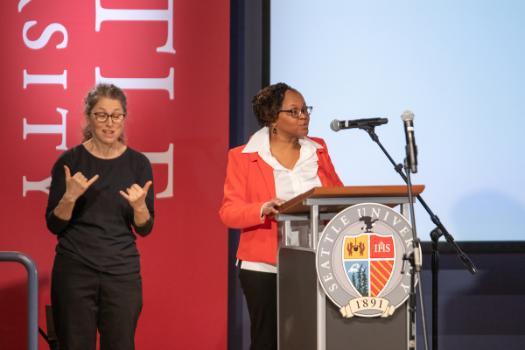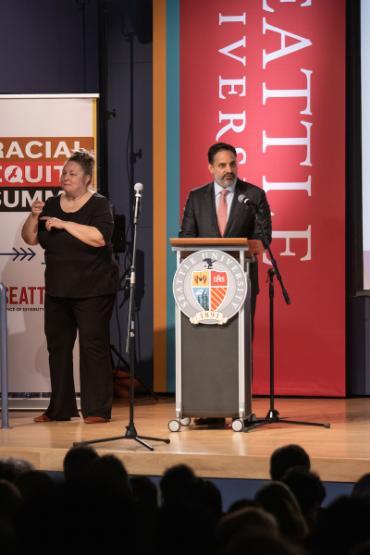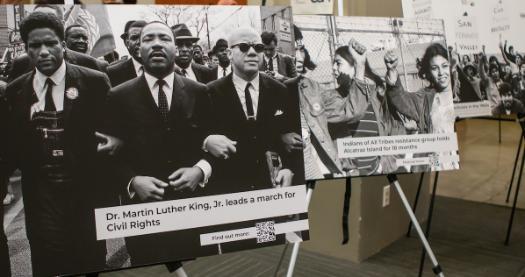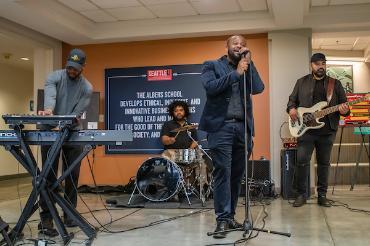Freedom to Dream—For Hope, Empowerment, Social Change
Written by Andrew Binion
Wednesday, April 19, 2023
Freedom to Dream—For Hope, Empowerment, Social Change
The Seattle University community gathered April 13 for the second Racial Equity Summit, a half-day symposium centered on the theme of “Freedom Dreaming” that drew nearly a thousand people to deepen their understanding and build collaborative capacity to pursue antiracist education.
Organized by the Office of Diversity and Inclusion, the Racial Equity Summit—a LIFT SU initiative—was different from the first in 2021 in that it gathered the SU community in-person versus an all-virtual event at the height of the pandemic. This year’s event featured keynote speaker, acclaimed author and scholar Dr. Imani Perry.
Stevie Rodler, ‘24, a communications and theater double major, said it was inspiring to see the size of the crowd that turned out to take the journey together.
“It’s great to see all the students,” Rodler said, while watching the crowd mix together between sessions. “This is us, this is who we are.”

Woven through the speeches by Dr. Perry—who appeared virtually—and SU President Eduardo Peñalver were efforts by states to restrict educational instruction on racism and its history in the United States and how illuminating the past brings with it discomfort but can widen empathy.
President Peñalver, calling out Florida’s “Stop WOKE Act” of 2022, championed by Gov. Ron DeSantis, said that suppressing ideas, whether in favor or against, runs counter to the mission of SU.
“We need to embrace discomfort,” Peñalver said. “In the same way that discomfort is an essential and universal part of physical exercise, intellectual discomfort is a universal aspect of education, done correctly. If we are never uncomfortable, we are not growing. And the value of discomfort is not just for the bad people, for the benighted people on the other side of whatever issue it is we are discussing. Discomfort is the constant companion of those committed to learning.”

Third year law school student Maya Bradshaw, ‘23, had read Dr. Perry’s book, the 2022 National Book Award for Nonfiction South to America: A Journey Below the Mason-Dixon to Understand the Soul of a Nation and arrived early to stake out a seat as Pigott Auditorium quickly filled up. Bradshaw came with a series of questions raised by Dr. Perry’s book.
“Like what will racial equality look like in our country now?” Bradshaw asked. “I don’t know if I’ll get an answer, but it’s a starting point.”
In her speech, Dr. Perry expanded on the idea of discomfort in education but suggested the people who are now being made to feel discomfort are not necessarily the students.
She mentioned the concern for white children who could be made to feel badly when hearing stories of atrocities of the past.
“I always think, ‘How terrible to suffocate the moral imaginations of white children. To believe that they cannot identify with the stories of the enslaved, the colonized, the marginalized, those who walked the trail of tears, those who built the railroads,’” Dr. Perry told the audience. “Nobody understands unfairness as much as children.”
Dr. Perry continued, saying: “Increasingly I gather the fear is these children will identify with those people and therefore will become and craft themselves in new ways. Instead of feeling angst over the question, ‘Am I racist or not?’ or ‘Am I going to be accused of this and that?’ That their sense of ‘I’ and ‘we’ will shift so vastly that the concept of ally will no longer have any use, because the understanding that it is all of our struggle will emerge.”
In addition to speeches, attendees broke off for two, 50-minute sessions of Freedom School, where participants could choose from nearly 20 different presentations. Subjects ranged from artificial intelligence and racial equity to the benefits of direct action and portrayals of racial intersectionality in the media.
Assistant Professor of Marketing Natalie Welch, PhD, an enrolled member of the Eastern Band of Cherokee Indians, led a presentation on Native American boarding schools. Dr. Welch touched on the personal experience of her family and how boarding schools stripped indigenous youth of their cultures, sometimes forcibly removing them from their families.

Anticipating the discomfort the presentation would stoke, and adding a touch of levity, Dr. Welch prefaced her presentation with romantic images of boarding schools like that from the TV show Gossip Girl.
“This is not that,” Dr. Welch said.
Katie Sharp, ‘24, an environmental studies major, said the summit left attendees with a clearer idea of what is ahead.
“There is a lot of work to be done, but it’s a good jumping off point,” Sharp said.

Natasha Martin, JD, vice president for diversity and inclusion and associate professor of law, emphasized that the summit’s theme of “Freedom Dreaming” is not a fantasy or a daydream, rather it is a mindful, continuous act of empowerment and hope.
“Let’s keep the dream alive,” Martin told the audience.
/48x0:1144x692/prod01/channel_34/media/seattle-university/news-amp-stories/images/MLK-event-speaker-closeup.jpg)
/18x0:2377x1490/prod01/channel_34/media/seattle-university/news-amp-stories/images/Immersion-trip-group-shot-USE.jpg)
/0x43:2400x1559/prod01/channel_34/media/seattle-university/news-amp-stories/images/immigration-summit-photo-main.jpg)